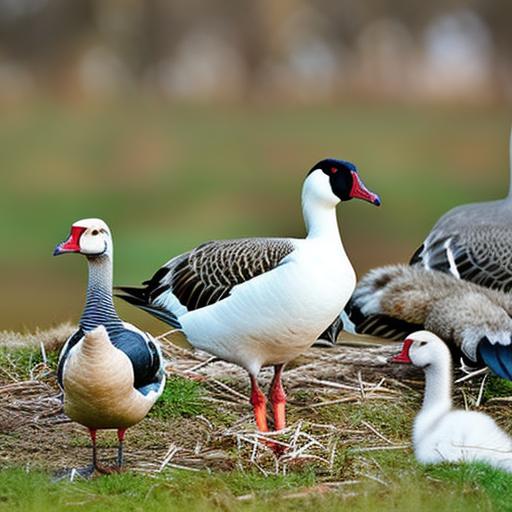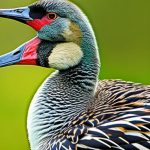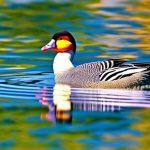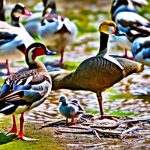Winter care is crucial for geese to ensure their health and happiness during the colder months. Geese are hardy birds, but they still require special attention and care to thrive in winter conditions. By providing proper winter care, you can help your geese stay warm, healthy, and comfortable throughout the season.
Keeping geese healthy and happy during winter is important for several reasons. First and foremost, it is our responsibility as caretakers to ensure the well-being of our animals. Geese that are not properly cared for in winter can suffer from various health issues, including frostbite, respiratory problems, and stress-related illnesses. Additionally, geese that are not provided with adequate care may experience a decline in egg production or weight loss.
Key Takeaways
- Winter care for geese is essential to ensure their health and well-being during the colder months.
- Preparing the coop for winter involves insulating it, providing adequate ventilation, and ensuring it is predator-proof.
- Feeding and watering geese in winter requires providing them with a balanced diet and ensuring their water source does not freeze.
- Managing temperature and humidity levels in the coop involves using heat lamps and monitoring moisture levels.
- Protecting geese from winter predators involves using fencing, netting, and other deterrents.
Preparing the Coop for Winter
One of the first steps in winter care for geese is preparing their coop. Insulating the coop is essential to keep the birds warm during cold weather. Insulation can be added to the walls and roof of the coop using materials such as straw, hay, or foam boards. This will help retain heat and prevent drafts from entering the coop.
Proper ventilation is also important in the coop to prevent moisture buildup and maintain air quality. Adequate ventilation can be achieved by installing vents or windows that can be opened or closed as needed. It is important to strike a balance between insulation and ventilation to ensure a comfortable environment for the geese.
Checking for drafts is another crucial step in preparing the coop for winter. Drafts can cause cold air to enter the coop, making it difficult for geese to stay warm. Inspect the coop thoroughly for any gaps or cracks where drafts may be coming in and seal them with caulk or weatherstripping.
Adding bedding to the coop is essential for providing warmth and comfort to the geese. Straw or wood shavings can be used as bedding material. Make sure to regularly clean and replace the bedding to maintain cleanliness and prevent the buildup of moisture.
Feeding and Watering Geese in Winter
Feeding geese a balanced diet is important year-round, but it becomes even more crucial during winter. Geese require a diet that is high in nutrients to help them stay healthy and maintain their body temperature. Provide a balanced feed that is specifically formulated for geese, and supplement their diet with fresh greens, vegetables, and fruits.
Offering warm water to geese during winter is essential for their hydration. Geese may be reluctant to drink cold water, so providing warm water can encourage them to drink enough and stay hydrated. Use heated waterers or replace the water frequently with warm water to ensure it doesn’t freeze.
Adjusting the feeding schedule during winter can also be beneficial for geese. Since they require more energy to stay warm, consider increasing their feed portions or offering additional meals throughout the day. Monitor their weight and adjust the feeding schedule accordingly to ensure they are getting enough nutrition.
Monitoring water intake is crucial during winter, as geese may not drink enough if the water is too cold or frozen. Keep an eye on their water consumption and make sure they have access to fresh, unfrozen water at all times. If necessary, provide additional water sources or use heated waterers to prevent freezing.
Managing Temperature and Humidity Levels in the Coop
Maintaining proper temperature and humidity levels in the coop is essential for the well-being of geese during winter. Use a thermometer and hygrometer to monitor these levels regularly.
The ideal temperature for geese in winter is around 40-50 degrees Fahrenheit (4-10 degrees Celsius). Adjust the temperature in the coop accordingly by using heaters or heat lamps if necessary. However, be cautious not to overheat the coop, as this can lead to respiratory issues or other health problems.
Humidity levels should be kept between 50-70% in the coop. High humidity can lead to moisture buildup and increase the risk of respiratory issues and frostbite. Use a dehumidifier or ventilation system to maintain proper humidity levels.
Avoiding overheating is crucial for the health of geese. While it is important to provide warmth, excessive heat can be harmful. Make sure the coop is well-ventilated and monitor the temperature regularly to ensure it stays within a safe range.
Protecting Geese from Winter Predators
Winter predators can pose a threat to geese, so it is important to take measures to protect them. Common predators include foxes, raccoons, coyotes, and birds of prey.
Securing the coop and run is essential to prevent predators from gaining access to the geese. Use sturdy fencing that is buried at least a foot into the ground to deter predators from digging under it. Install a secure door with locks to prevent predators from entering the coop.
Using deterrents can also help keep predators away from the geese. Motion-activated lights or sprinklers can startle predators and discourage them from approaching. Additionally, placing reflective objects or noise-making devices near the coop can help deter predators.
Preventing Common Winter Health Issues in Geese
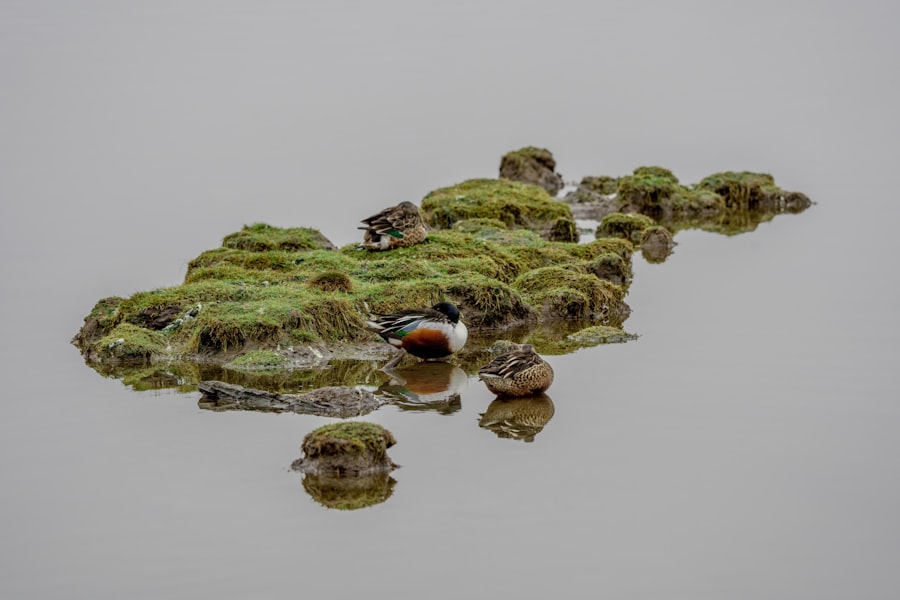
Winter can bring about various health issues in geese, but with proper care, many of these issues can be prevented or minimized.
Recognizing signs of illness in geese is crucial for early intervention. Common signs of illness include lethargy, loss of appetite, difficulty breathing, coughing, sneezing, or changes in behavior. If you notice any of these signs, consult a veterinarian for proper diagnosis and treatment.
Frostbite is a common issue in geese during winter, especially in their feet and wattles. To prevent frostbite, make sure the coop is well-insulated and free from drafts. Provide extra bedding for the geese to keep their feet warm. If frostbite does occur, consult a veterinarian for proper treatment.
Respiratory issues can also arise in geese during winter due to cold and damp conditions. To prevent respiratory problems, ensure proper ventilation in the coop and maintain a clean and dry environment. If respiratory issues occur, consult a veterinarian for appropriate treatment.
Older geese may require extra care during winter, as they may be more susceptible to health issues. Provide additional warmth and comfort to older geese by offering extra bedding and ensuring they have easy access to food and water.
Providing Adequate Exercise and Entertainment for Geese
Geese require exercise and mental stimulation to stay healthy and happy during winter. Encourage exercise by providing a safe outdoor space for them to roam and graze. Make sure the area is free from hazards such as ice or slippery surfaces.
Offering toys and treats can provide entertainment for geese during winter. Hang a treat ball filled with grains or vegetables for them to peck at, or provide puzzle toys that require them to work for their food. This will help keep them mentally stimulated and prevent boredom.
Providing a safe outdoor space is important for geese to get fresh air and sunlight during winter. Make sure the outdoor area is securely fenced to prevent predators from entering. Clear any snow or ice from the area to make it safe for the geese to walk on.
Maintaining Cleanliness and Hygiene in the Coop
Maintaining cleanliness and hygiene in the coop is crucial for the health of geese. Regularly clean the coop and run to remove droppings, feathers, and other debris. This will help prevent the buildup of bacteria and parasites.
Disinfecting surfaces in the coop is important to kill any harmful bacteria or viruses. Use a poultry-safe disinfectant to clean surfaces such as perches, nesting boxes, and feeders. Follow the instructions on the disinfectant for proper use and dilution.
Properly disposing of waste is essential to prevent the spread of diseases. Use a designated waste disposal system and ensure that waste is properly sealed and removed from the coop regularly.
Addressing Behavioral Changes in Geese during Winter
Geese may exhibit behavioral changes during winter due to seasonal factors. Understanding these changes can help you provide comfort and reassurance to your geese.
Seasonal changes in behavior can include increased aggression, decreased activity, or changes in feeding patterns. Provide comfort and reassurance to your geese by spending time with them and offering treats or toys. This will help alleviate any stress or anxiety they may be experiencing.
Monitor for signs of stress in your geese, such as excessive feather plucking, pacing, or vocalization. If you notice any signs of stress, try to identify the cause and make necessary adjustments to their environment or routine.
Tips for Successfully Keeping Geese Over Winter
To successfully keep geese over winter, it is important to follow the guidelines mentioned above. Recap the key points of winter care for geese, including preparing the coop, providing a balanced diet, managing temperature and humidity levels, protecting from predators, preventing health issues, providing exercise and entertainment, maintaining cleanliness and hygiene, and addressing behavioral changes.
In addition to these key points, here are some additional tips for keeping geese healthy and happy during winter:
– Provide extra bedding during extremely cold weather to help insulate the coop.
– Use heated waterers or place a heated rock in the water to prevent freezing.
– Offer additional treats or high-calorie foods during colder months to provide extra energy.
– Monitor geese closely for any signs of illness or injury and seek veterinary care if needed.
– Consider providing a heat source in the coop if temperatures drop significantly.
– Provide extra protection for geese during severe weather conditions, such as heavy snow or ice storms.
Remember, every flock is unique, and it may take some trial and error to find the best winter care routine for your geese. Don’t be afraid to experiment and adjust your methods based on the specific needs of your birds.
In conclusion, winter care for geese is essential to ensure their health and happiness during the colder months. By following the guidelines outlined in this article, you can provide the necessary care and attention to keep your geese thriving throughout winter. Remember to share your experiences and tips in the comments section below to help others in their winter care journey.
If you’re interested in keeping geese over winter, you may also find this article on turning a shed into a chicken coop helpful. The article provides valuable insights and tips on how to convert a shed into a suitable living space for chickens, which can be adapted for geese as well. From insulation to ventilation, this resource covers all the essential aspects of creating a cozy and functional shelter for your feathered friends. Check it out here!
FAQs
What is the best way to keep geese over winter?
The best way to keep geese over winter is to provide them with a warm and dry shelter, plenty of food and water, and protection from predators.
What kind of shelter do geese need in winter?
Geese need a shelter that is dry, draft-free, and well-ventilated. The shelter should be large enough to accommodate all the geese comfortably and should have a solid floor to protect them from the cold ground.
What kind of food do geese need in winter?
Geese need a diet that is high in protein and fat to help them stay warm in the winter. Good options include corn, wheat, barley, and soybeans. Geese also need access to fresh water at all times.
How do I protect my geese from predators in winter?
To protect your geese from predators in winter, you should make sure their shelter is secure and has a strong door that can be locked at night. You should also install fencing around the perimeter of their enclosure to keep out predators.
What kind of health issues should I watch out for in my geese during winter?
During winter, geese are susceptible to respiratory infections, frostbite, and dehydration. You should monitor your geese closely for signs of illness and make sure they have access to clean water at all times. If you notice any health issues, contact a veterinarian immediately.
Meet Walter, the feathered-friend fanatic of Florida! Nestled in the sunshine state, Walter struts through life with his feathered companions, clucking his way to happiness. With a coop that’s fancier than a five-star hotel, he’s the Don Juan of the chicken world. When he’s not teaching his hens to do the cha-cha, you’ll find him in a heated debate with his prized rooster, Sir Clucks-a-Lot. Walter’s poultry passion is no yolk; he’s the sunny-side-up guy you never knew you needed in your flock of friends!

